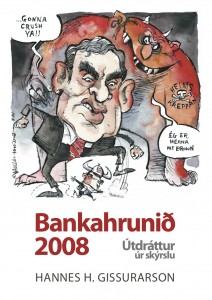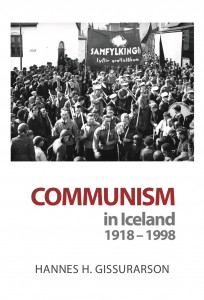 In December 2021, the Politics and Economics Centre at the Social Science Research Centre, University of Iceland, published two books by Professor Hannes H. Gissurarson, RNH Academic Director. One of them is in Icelandic, Bankahrunid 2008: Utdrattur ur skyrslu [The 2008 Bank Collapse: Summary of a Report]. It is a summary in 64 pages of the report on the 2008 collapse which Gissurarson wrote in English for the Icelandic Ministry of Finance and Economic Affairs in 2018. His conclusion was that it was an unnecessary and brutal action when the British Labour government invoked the anti-terrorism law against Iceland in 2008. That government bailed out all British banks except the two banks owned by Icelanders, whereas it turned out that those banks were both solvent unlike some of the banks rescued, in particular RBS, the Royal Bank of Scotland. The reason why the whole banking sector in Iceland collapsed was that the Central Bank of Iceland (where Gissurarson served on the Board of Overseers between 2001 and 2009) was denied the same liquidity assistance that the Scandinavian banks received.
In December 2021, the Politics and Economics Centre at the Social Science Research Centre, University of Iceland, published two books by Professor Hannes H. Gissurarson, RNH Academic Director. One of them is in Icelandic, Bankahrunid 2008: Utdrattur ur skyrslu [The 2008 Bank Collapse: Summary of a Report]. It is a summary in 64 pages of the report on the 2008 collapse which Gissurarson wrote in English for the Icelandic Ministry of Finance and Economic Affairs in 2018. His conclusion was that it was an unnecessary and brutal action when the British Labour government invoked the anti-terrorism law against Iceland in 2008. That government bailed out all British banks except the two banks owned by Icelanders, whereas it turned out that those banks were both solvent unlike some of the banks rescued, in particular RBS, the Royal Bank of Scotland. The reason why the whole banking sector in Iceland collapsed was that the Central Bank of Iceland (where Gissurarson served on the Board of Overseers between 2001 and 2009) was denied the same liquidity assistance that the Scandinavian banks received.
 The other book is in English, Communism in Iceland, 1918–1998. It is a brief history, 160 pages, of the radical left-wing movement in Iceland which operated as a faction in the Labour Party (the social democrats) until 1930, in the Communist Party of Iceland in 1930–1938, in the Socialist Unity Party in 1938–1968, and in the People’s Alliance in 1968–1998. The book is largely based on documents found in Russian archives after the collapse of the Soviet Union. These documents, mostly in German, were copied by Russian-speaking philosopher Arnor Hannibalsson in 1992 and given to Gissurarson who has since deposited them in the National Library of Iceland. The book contains many stories about individuals and their activities, such as the narrow escape from the Gulag of renegade communist Stefan Pjetursson, who was being trained in one of Comintern’s secret camps in Moscow, the strange case of Dr Bruno Kress, a German specialist on the Icelandic language, who became a communist after having been a zealous Nazi, and the tragic fate of an Icelander’s girlfriend in Moscow, Vera Hertzsch who was arrested with their one-year old child in 1938, and sent to the Gulag where mother and child both perished. In the Conclusions, Gissurarson tries to explain why the Icelandic communists and radical socialists long had more support than the social democrats.
The other book is in English, Communism in Iceland, 1918–1998. It is a brief history, 160 pages, of the radical left-wing movement in Iceland which operated as a faction in the Labour Party (the social democrats) until 1930, in the Communist Party of Iceland in 1930–1938, in the Socialist Unity Party in 1938–1968, and in the People’s Alliance in 1968–1998. The book is largely based on documents found in Russian archives after the collapse of the Soviet Union. These documents, mostly in German, were copied by Russian-speaking philosopher Arnor Hannibalsson in 1992 and given to Gissurarson who has since deposited them in the National Library of Iceland. The book contains many stories about individuals and their activities, such as the narrow escape from the Gulag of renegade communist Stefan Pjetursson, who was being trained in one of Comintern’s secret camps in Moscow, the strange case of Dr Bruno Kress, a German specialist on the Icelandic language, who became a communist after having been a zealous Nazi, and the tragic fate of an Icelander’s girlfriend in Moscow, Vera Hertzsch who was arrested with their one-year old child in 1938, and sent to the Gulag where mother and child both perished. In the Conclusions, Gissurarson tries to explain why the Icelandic communists and radical socialists long had more support than the social democrats.


